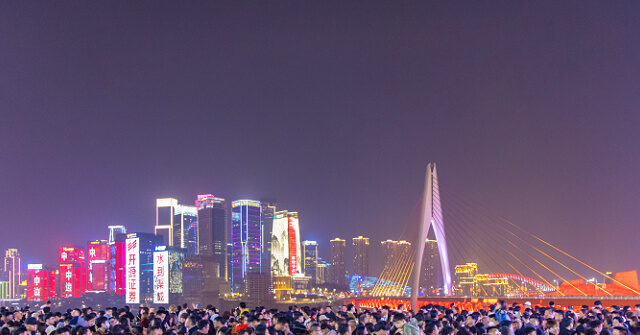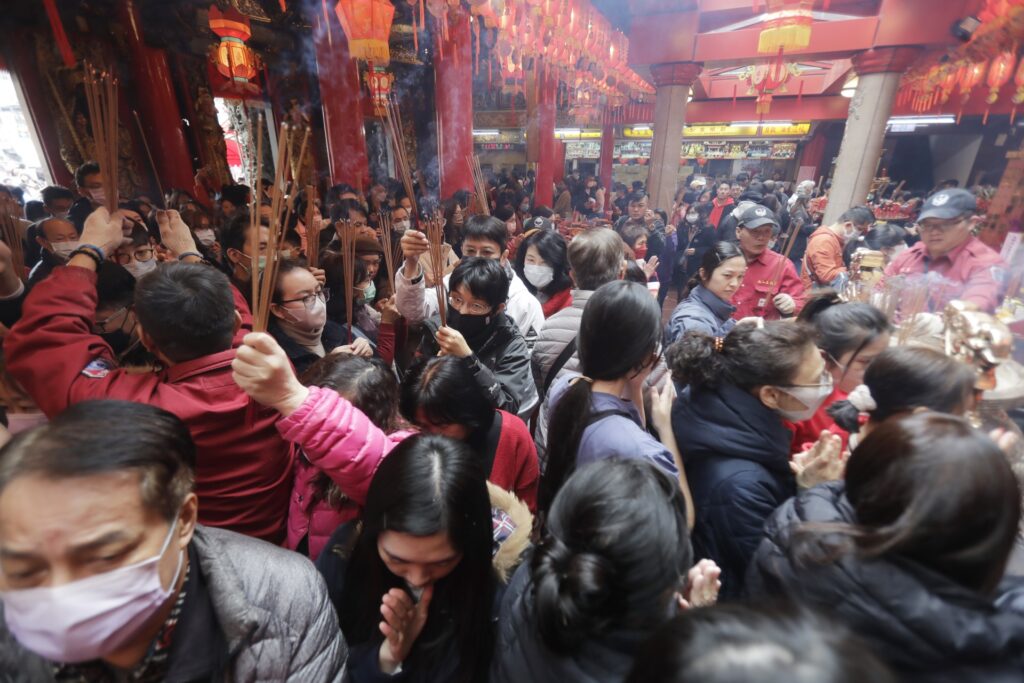Top News
China Claims Largest Travel Season Ever, Seeking to Calm Worried Investors

Chinese state media on Sunday trumpeted a record-breaking domestic travel season for the Lunar New Year holiday, which was one of the heaviest travel seasons in the world before the Wuhan coronavirus pandemic.
China hopes the alleged massive travel spike and boost in consumer spending will calm investors nervous about the Chinese economy and looking for alternative Asian investments.
“The travel and spending boom during the eight-day holidays underlined improved sentiment among Chinese consumers and fully illuminated the vitality and vast potential of China’s consumption market, the biggest economic growth driver, which helps brighten the outlook for China’s economic recovery in 2024 and beyond,” boasted the state-run Global Times, making Beijing’s message to global investors explicit.
According to the Global Times, Chinese government planners rushed back into the offices as soon as the Lunar New Year holiday was done to “map out economic work for the rest of the year, with the focus on issues such as optimizing the business environment and improving efficiency among officials.”
People walk near Houhai Lake in Beijing, Thursday, Feb. 8, 2024. Chinese shares rose Thursday as investors appeared to welcome Beijing’s choice of an industry veteran to replace its top securities watchdog in its latest effort to boost confidence in ailing markets. (AP Photo/Andy Wong)
Every Chinese official, all the way up to Premier Li Qiang, strove to give the impression they could not wait to get back to their desks and plan for the bright economic future illuminated by the slam-bang holiday season:
During the eight-day Chinese Lunar New Year holidays that ended on Saturday, 474 million domestic trips were made, up 34.3 percent year-on-year, and the total domestic tourism spending jumped by 47.3 percent year-on-year to about 632.69 billion yuan ($87.95 billion), according to data released by the Ministry of Culture and Tourism (MCT) on Sunday.
Significantly, the number of trips made during the holidays represented a 19 percent growth from the level during the same period in 2019 before the pandemic, and total spending increased by 7.7 percent from that of the same period in 2019, the MCT data showed.
The Global Times surveyed the Chinese landscape and saw nothing but “bustling scenes across the country,” from railroads and airports to tourist attractions and movie theaters. The Chinese box office reported over a billion dollars in ticket sales during the holiday, a new record.
“China’s improved economic vitality was also evidently felt overseas, as many Chinese visited various countries in significantly large numbers during the holidays. In total, Chinese visitors made 3.6 million outbound trips, while the number of inbound trips reached 3.23 million,” the Global Times chirped, acting as though all doubts of China’s economy had been banished around the globe over the previous eight days.
The actual story of the Chinese economy has been considerably less upbeat over the past few months, as investors move their money to alternatives like India and consider the possibility that China’s boom years are over for good. China’s post-pandemic recovery has lagged considerably behind its optimistic projections, eventually hitting revised government growth targets but leaving foreign investors a little nervous — and perhaps a little more cognizant of the moral hazards of dealing with a genocidal tyranny than they were when China’s growth seemed unstoppable.
Foreign direct investment in China dropped to its lowest level since the early 1990s last year. Forbes made the observation on Monday that foreign analysts have grown so accustomed to the opacity and duplicity of Chinese officials — and so distrustful of the headline economic news trumpeted by Chinese state media outlets — that they pore over “micro indicators like electricity usage” to figure out what the economy is really doing today and what Chinese officials might do tomorrow.

Worshippers go to pray at a temple on the first day of the Lunar New Year celebrations in Taipei, Taiwan, Saturday, Feb. 10, 2024. (AP Photo/Chiang Ying-ying)
Forbes listed three main factors of concern for foreign investors: fear of a conflict over Taiwan, fear that the Chinese property market will implode and crash the economy, and “the apparently lack of urgency in economic policy making” — the very same urgency the Global Times labored to present in its articles about Beijing bureaucrats leaping off their vacation planes and landing in their cubicles, spirits buoyed by the fabulous Lunar New Year travel season.
The Global Times published some articles in which its reporters went home for the Spring Festival and marveled at how energetic and prosperous their hometowns were.
In one such article from Sunday, the Global Times slammed people who think the “festive feeling is fading” in China, because everywhere writers for its tightly controlled state media look, they see nothing but radiant enthusiasm and public transportation that can barely keep up with all the happy travelers.
“I know that when the New Year’s celebration is truly over, the city will return to its normal operations, but people will start the new year with confidence and good expectations,” a reporter who visited Shandong predicted.
Read the full article here


















